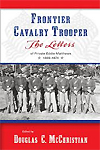
Frontier Cavalry Trooper: The Letters of Private Eddie Matthews, 1869–1874, edited by Douglas C. McChristian, University of New Mexico Press, Albuquerque, 2013, $55
Douglas C. McChristian, a retired research historian for the National Park Service, has penned six excellent chronicles of the American West, including his Spur Award–winning Fort Laramie: Military Bastion of the High Plains. In this tome he acts instead as editor of a voluminous treasure of letters penned by Private Eddie Matthews to his family during the post–Civil War era. The book serves as a chronicle of a man’s life and also as a journal of westward expansion.
Wild West contributor John Koster earns a nod from the author in his introduction. It was Koster who brought the Matthews letters to light in a 1980 American Heritage article and preserved the trove Matthews’ granddaughter Ora Bublitz had industriously typed out. Thus the letters are largely uncorrected; original spellings (or misspellings) are common, and in some spots are minor gaps where words were illegible or missing. Such peculiarities make the overall experience not unlike peeking into someone’s personal diary, albeit without the accompanying guilt.
The book retains a remarkable narrative cohesion thanks to McChristian’s extensive footnotes. The life of a solider was, as Matthews candidly admits, often mundane—not that he was necessarily interested in risky adventure:
As regards myself, [I] can’t say that I felt very rejoiced at the prospects of a fight with Indians, $13.00 a month is not an incentive to throw ones life away. And as to my patriotic feelings, I candidly say, I have none. I have never been blessed with the inspiration. And while riding along my thoughts went back to little Maryland, to green fields, friends, Loved parents, Brothers and Sisters, and the day I would be free to enjoy the pleasures of my home and the company of those ‘loved Ones at Home.’
Matthews’ journey takes him across the country, from his home in Maryland to his Army service in Arizona, New Mexico, Colorado and California. He witnesses the expansion of rail service to the West, as well as confrontations with Indians in which he played a direct role. There are a number of rousing scenes, including this entry during his post at Fort Bascom, New Mexico Territory, in August 1872:
About 1 o’clock a.m., I awoke from a sound sleep by the report of several Carbines, connected with the most unearthly yelling it has ever been my misfortune to listen to. It sounded to me like all the Devils incarnate, and all the Demons of Hell had issued forth in that one lonely spot to make the night hideous with their orgies. No pen is capable of describing my feelings at that moment.
Sometimes, too, a gentle humor pervades his insights, such as the day he attempted to iron his own clothing:
As I had never done any ironing before [I] had some doubts about the success of the thing. Thought I had better experiment a little before trying my hand on a white shirt, had no starch, but that made no difference. Spread out my towel, grasped the iron firmly, burnt my sore hand a little and made a lunge out. Result: towel looked like a yellow cat singed. Iron was too hot.…Concluded a man couldn’t iron cloth[e]s unless he knew how.
That simple story belies the underlying and mostly unspoken premise of the book: That Matthews’ story is not so much that of a soldier as an intimate view into an era long past.
Martin A. Bartels




